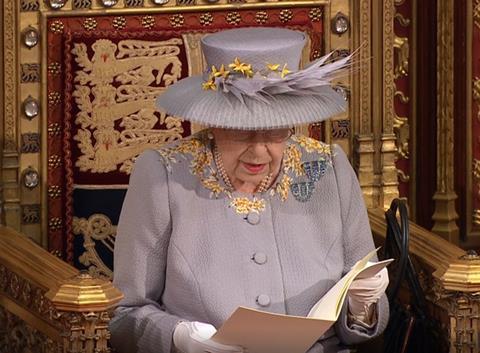Major planning overhaul at centre of government’s agenda for the year
Sweeping reforms to planning laws were at the centre of today’s Queen’s Speech as the government set out its agenda for what could be a watershed year for the construction industry.
The Planning Bill is now set to be brought before parliament this autumn and is expected to include proposals to scrap Section 106 agreements and replace it with a new Infrastructure Levy.

It will also introduce new design codes and force councils to zone land for “growth”, “protection” or “renewal”, with land labelled for growth getting automatic outline planning permission. Councils will be unable to reject applications which accord with local rules.
The Queen’s Speech said the government plans to press ahead with the reforms despite objections from environmental groups.
Ministers have been reported to believe the reforms are the best way to boost home ownership, which is seen as a factor in the Conservative party’s electoral success in the ‘red wall’ of former Labour seats over the past two years.
Assael Architecture managing director Pete Ladhams welcomed the proposals, saying that the current system was “urgently in need of an overhaul”.
He said automatic approval in areas zoned as growth will allow architects to “respond to the urgent needs of towns and cities swiftly”, adding that it will “greatly increase” the government’s chances of hitting its target to build 300,000 homes a year.
London affordable housing developer Dolphin Living also backed the plans, with its chief executive Olivia Harris saying it was right that the government was reforming planning as part of the post-covid recovery.
And modular housing developers also gave their support, with TopHat managing director Andrew Shepherd saying it could “act as a catalyst for innovation” by driving the uptake of modern methods of construction.
Dave Sheridan, executive chairman of modular housebuilder Ilke Homes, said the Queen’s Speech was “fantastic news for the housebuilding industry”.
But Royal Town Planning Institute chief executive Victoria Hills suggested the zoning proposals needed “further nuance” to differentiate between areas needing radical masterplanning from suburbs and industrial areas primed for redevelopment.
And Liberal Democrat leader Ed Davey blasted the plans, saying that they would “rip powers away from local people and communities in favour of wealthy property developers, threatening our environment and treasured green spaces”.
The speech also included confirmation that a Building Safety Regulator is being set up as part of the Building Safety Bill, which will be introduced this year.
NBS spokesperson Richard Waterhouse backed the plans but said that the regulator must have access to digital records and accurate record-keeping on behalf of building owners “so that transparency is at the heart of the construction industry”.
“Only when this is done will the design teams, constructors, and end-users have the assurances they need to know the products have been specified in the right way and to the correct standards.”
Also in the speech were proposals to introduce legislation setting binding net zero targets, a streamlining of public procurement and legislation to support a “lifetime skills guarantee” to enable people to access training throughout their lives.
Arcadis UK cities director Peter Hogg said the focus on skills will be welcome news to the industry with growth “constrained by capability, and individuals whose skills are mismatched to a fast-changing workplace alike”.
Director of external affairs for the Civil Engineering Contractors Association (CECA) Marie-Claude Hemming welcomed the plans to simplify public procurement and said she hoped the government would consider the findings of a review into frameworks currently being carried out.
Turner & Townsend UK managing director Patricia Moore said that procurement was a “vital piece of the puzzle” for the industry’s capacity to deliver the government’s building agenda.
“As construction’s biggest client, it is government that needs to lead the charge and initiate this change – speeding up and simplifying processes, prioritising local businesses, investing in new technologies and mandating sustainable procurement solutions.”


























No comments yet